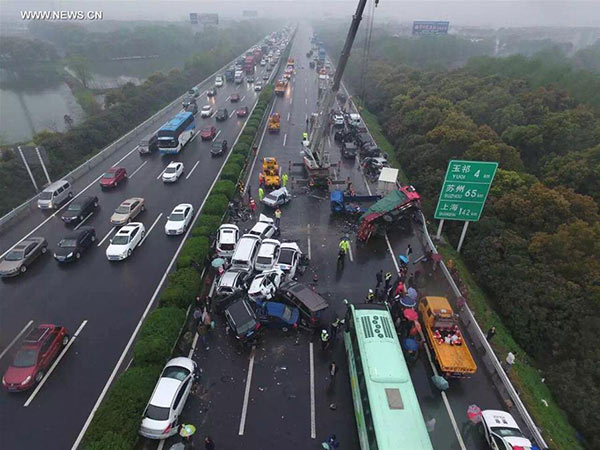Better driving habits can reduce road casualties
(China Daily) Updated: 2016-04-05 07:46
 |
|
Photo taken on April 2, 2016 shows the accident site where vehicles pile up at the Changzhou section of the highway linking Shanghai and Nanjing, East China's Jiangsu Province. At least two people died and dozens injured in the accident. [Photo/Xinhua] |
On Saturday, a pile-up on the expressway linking Shanghai and neighboring Jiangsu province in East China killed three people and injured over 20. That could have been avoided had bad driving habits not been so common, said an editorial on thepaper.cn on Sunday:
What happened on Saturday is only one of the many road accidents that happen each year.
Many say the chief cause is the fast rise in car ownership in China. That's not true. In neighboring Japan, the number of automobiles reached 48 million as early as 2012, or 0.93 for every family; in China, even in 2015 there were 124 million registered cars, or 0.31 for every family.
In Japan, the number of deaths caused by traffic accidents was 4,117 in 2015, 1.5 percent the number in China. A larger number of cars does not necessarily make the road more dangerous.
A big difference between Japan and China is Japanese drivers have better driving habits and more strictly follow the traffic rules. One after another, surveys show that the majority of accidents in China are caused by drivers breaking the traffic rules.
Every driving school teaches its students that bad driving habits might be fatal, yet many drivers simply ignore the rules the first day they are on the road. They always break traffic laws whenever there is little risk of being caught by the police. Some pedestrians have bad habits, too, and jaywalking is quite common among them because they believe cars will avoid hitting them.
It is time the law be better enforced in order to change people's behavior.
- E China pileup death toll increases to 3 with 31 injured
- 7 killed in SW China pileup
- 33-car pileup leaves six dead, four injured in Shanxi
- Car pileup on bridge leaves 2 dead, 65 hurt
- Expressway pileup kills 12 in south China
- 7 killed in East China's highway pileup
- 4 dead, over 30 injured in SW China pileup
- 15 dead after China expressway pileup

I’ve lived in China for quite a considerable time including my graduate school years, travelled and worked in a few cities and still choose my destination taking into consideration the density of smog or PM2.5 particulate matter in the region.










